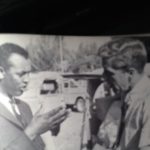Ethiopia’s First Peace Corps Staff, Part Six
Bill Kruse, who flew into Addis Ababa on August 5, 1962, was born in Chicago and raised in Des Plaines, Illinois. He was a student at the University of Illinois in 1944 when he became a flight engineer with the Army Air Corps and was shipped off to Puerto Rico and the Caribbean Defense Command, where he became the founder and editor of the Caribbean Defense Command News Digest.
After his army discharge, he returned to the University of Illinois and before earning his B.A. in English in 1949, he knocked off one semester to hitch-hike with a friend through the South and back to Chicago working as common laborers on the way.
For a few years after his graduation he moved from job to job—to the steel mills of South Chicago, to Marshall Field’s furniture department, to the stockyards, a trucking firm.
In June, 1953, he became a copywriter for Kraft Foods where he remained for six years. As editor of SalesKraft, he won an international Editors Association award for outstanding industrial journalism. His book on the merchandising of dairy products, widely used as a business school textbook won an award and trophy from the Chicago Federated Advertising Club.
In July, 1960, Kruse became executive director of the Uptown Chicago Commission, which works toward urban renewal. In this role, Kruse came to the attention of Shriver, who urged him to come to Washington for interviews at the Peace Corps. He signed up on June 7, one week before his wife, the former Aileen Armstrong of Larchmont, N.Y., gave birth to their second child, Sarah, who flew off to Ethiopia when she was two months old, along with her older sister, two-year-old Mary Joan.
By its second winter (1962), the Peace Corps had developed a catalogue of personnel, so to speak, which meant that the agency was no longer required to search outside its ranks for the ideal person to fill a vacancy.
For example, when Lawrence Dennis left the position of Associate Director for Volunteers, Sam Proctor, then Representative in Nigeria, replaced him, and Bascom Story agreed to move to Nigeria.
In Ethiopia, in the spring of 1963, Wofford decided as the result of experience to modify the regional system. Bill Canby would remain in Asmara until, on August 7, 1963, he would move to Addis Ababa to replace Bascom Story.
Also, Bill White and Bill Kruse would no longer be responsible for definite geographical. Kruse was placed in charge of those extra-curricular activities which would in time develop into community action programs. White was named liaison officer with the Ethiopian Ministry of Education.
However, Kruse had barely assumed his new duties, when on May 1, 1963, he was transferred to Nigeria as administrative officer.
On July 23, 1963, White was posted back to Washington as operations officer for Ethiopia. These shifts demanded fresh people in Addis Ababa. In June, 1963, David Chaney arrived to replace Kruse and during the month of August, 1963, two additional associate representative were assigned to Ethiopia—Don Romine and David Schimmel.
On October 17, 1963, Henry Scott flew in to take over White’s job as liaison with the Ministry of Education. And on September 15, 1963, Andrew Bell arrived to replace Canby in Asmara.
Research Document: Who’s Who in the Peace Corps Overseas Administration (1963)
The photographs are by Rowland Scherman, Paul Conklin and Jim Walls, first photographers for the agency.


No comments yet.
Add your comment